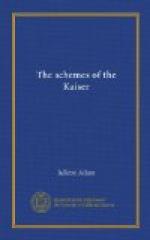As a matter of fact neither Austria nor Italy were with her, only one Power voted solidly with Germany—the Power which is not content with war and supplements it by massacres—the Turkey of Abdul Hamid. This isolation (an indirect result of the Franco-Russian alliance, which has compelled Austria to come to a complete understanding with Russia in regard to affairs in the Balkans, and led Italy to draw closer to France), this isolation is a great and inestimable victory, whose benefit must be frankly recognised by every honest mind in the two allied countries, a victory for those who, like myself, have worked heart and soul for the Franco-Russian alliance.
And it is now, now that these things are clearly proved, now, when Germany finds but one servile nation in Europe—Turkey—that the French Government thinks fit to seek to draw closer to Germany! The thing is unthinkable, unbelievable!
For years, acting upon an evil policy which I propose to elucidate hereafter, the Government of the Republic first set itself to oppose the alliance with Russia, preferring an alliance with Germany; later, this Government saw in the Russian alliance nothing but a means to gain public applause, to acquire popularity. Now that the strength and worth of this alliance have been revealed in all their truth by the isolation of Germany, this same Government of the Republic compels our sailors to suffer the courtesy of William II and prepares us, by diplomatic communiques, for an entente with Germany.
Only super-simpletons can believe in William II’s sham bluster against England on behalf of the Transvaal and of that Africa concerning which he has just concluded a binding treaty with Albion. One must either be hopelessly ignorant or wilfully blind not to see through the game of William II and to be fooled by his ingratiating ways.
His only object is to compel England to throw herself into his arms and to bring about a great common alliance of the Anglo-Saxon races. Will not the cynical supporters of the “policy of interest” experience a revulsion of conscience if they know whither they are leading us, or a sudden enlightenment, if they do not know? If not, then to those who, through cowardice or treachery, have lightly ruined the noblest of all causes, I shall say, “I wash my hands” of this crime of ignorance or base surrender. Weary, sick at heart and indignant I shall say it, in my own name and in the name of those who have died, suddenly or mysteriously, for the Franco-Russian cause.
Any one who followed carefully the successive events of the performance given under the direction of M. de Staal, any one familiar with the secret manoeuvres that led to the convening of the Peace Conference, could have had no difficulty in predicting what its end would be. From some of these secret manoeuvres in the wings, I propose to lift the veil; my readers will then be in a position to understand more clearly why it is that the truly Christian act of the Tzar (apart from certain unimportant improvements of the Brussels Convention) did not attain the result which might have been expected from the initiative of a powerful and generous sovereign.




